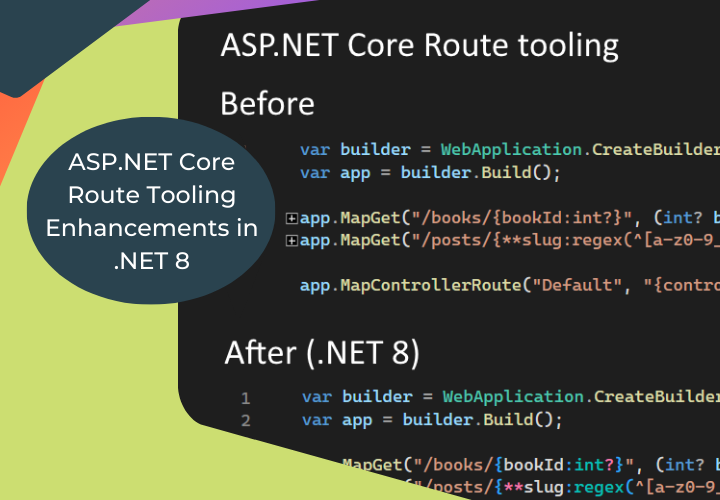
Being ahead of the curve is crucial in the dynamic world of web development. Developers can look forward to a number of exciting new features with .NET 8, especially in the area of ASP.NET Core route tooling. Since it can handle everything from the front end to the back end, ASP.NET Core in .NET 8 is your all-in-one solution for modern web development. Blazor offers dependable, high-performance backend APIs and services that let you create stunning, richly interactive web experiences. Cloud-native application development is made easy with ASP.NET Core in .NET 8, and excellent tools in Visual Studio and Visual Studio Code enhance productivity. Every developer is a full stack developer with ASP.NET Core in .NET 8! Dot Net Core Development professionals should find life much easier with these improvements. Here, we will examine how the significant route tooling improvements in .NET 8 can completely transform the web development process in this blog post.
Development of ASP.NET Core Route Tooling:
It’s essential to comprehend the importance of route tooling in ASP.NET Core before delving into the details of the improvements in.NET 8. The way your application handles HTTP requests is mainly dependent on routing. Building web applications requires understanding this fundamental concept, which specifies how URLs map to controllers and actions.
ASP.NET Core required developers to write complex route configurations in its earlier iterations manually. Although this method offered flexibility, it frequently produced complications and was prone to errors in code. Experts in Dot Net Core Development would spend a lot of time optimizing routes, which could have been better spent on other aspects of the project.
Attribute Routing Makes Route Configuration Simplified:
Route configuration was greatly enhanced with the introduction of attribute routing with the release of ASP.NET Core. This allowed developers to define routes directly on their controller actions using attributes, which resulted in cleaner, more readable code.
Website development companies can now easily create SEO-friendly URLs and logically arrange their routes thanks to attribute routing. With this method, the requirement for comprehensive route configuration in startup files was decreased, and overall code maintainability was increased.
Introducing .NET 8's Route Tooling Improvements:
With several route tooling improvements, .NET 8 elevates the convenience of attribute routing to a new level. With these improvements, the route definition process should become even more efficient, and Dot Net Core Development experts will have access to new features.
- Route Template Intellisense: The Route Template Intellisense is one of .NET 8’s most notable features. By giving route templates in your IDE autocompletion and real-time suggestions, this feature improves the developer experience. Whether you are defining routes with Visual Studio, Visual Studio Code, or any other IDE, you should anticipate a significant increase in productivity.
- Simplifying Route Constraints: .NET 8 introduces a more straightforward and concise syntax for defining route constraints, streamlining the process of specifying route constraints, which could be verbose and error-prone in previous versions of ASP.NET Core. This modification lowers the possibility of errors and makes the route constraints in your code more understandable.
- Worldwide Route Prefixing: Building websites, one of the biggest challenges faced by enterprises developing large-scale applications is keeping track of multiple routes that share a prefix. With the introduction of global route prefixing in .NET 8, developers can now specify a prefix that is applicable to all routes inside of a particular controller or area. It makes route management easier and guarantees that the application’s structure is the same throughout.
Advantages for the development of dot net core:
Professionals working in Dot Net Core Development can benefit from the following improvements in .NET 8’s route tooling:
- Enhanced Productivity: By expediting the route definition process, Route Template Intellisense reduces the amount of time needed to write and debug routes.
- Error Reduction: Common routing errors are avoided thanks to enhanced route management and a simplified syntax for route constraints.
- Consistency: By guaranteeing a uniform URL structure throughout the application, global route prefixing makes it simpler to manage and comprehend.
In summary, the improvements to the ASP.NET Core route tooling included in .NET 8 represent a significant advancement in helping website development companies and experts in Dot Net Core development to streamline the route configuration process. These enhancements improve web applications’ overall quality and maintainability in addition to increasing productivity. Web developers must stay current with the newest tools and improvements as the digital landscape changes constantly. The route tooling improvements in .NET 8 are evidence of the community’s dedication to offering state-of-the-art web development solutions. Better web applications can result from integrating these improvements into your development workflow, which can also lead to more error-free development procedures. To stay ahead in the field of web development, embrace the power of .NET 8 and make use of these route tooling enhancements.
Look no further than PECS, the finest website development company, if you’re searching for a dependable ASP.NET Core development to assist you in utilizing these improvements. PECS, one of the top-rated and most established ASP.NET Core development companies in Delhi, India, has a track record of providing clients worldwide with high-caliber software solutions.
Related Posts

Fintech App Development Guide for Startups and Financial Firms
Fintech app development has grown in popularity in recent years, with startups and financial firms alike looking to capitalize on…

How to Solve Problems as a Developer
Solving a problem in a challenging cut-off time requires meta-skill and to possess such skill is not easy. As a…

Custom Software Development – Benefits, Embracing Trends, and Best Practices for Success
In today's rapidly evolving digital landscape, businesses are harnessing the power of custom software development to drive innovation, streamline operations, and gain…
